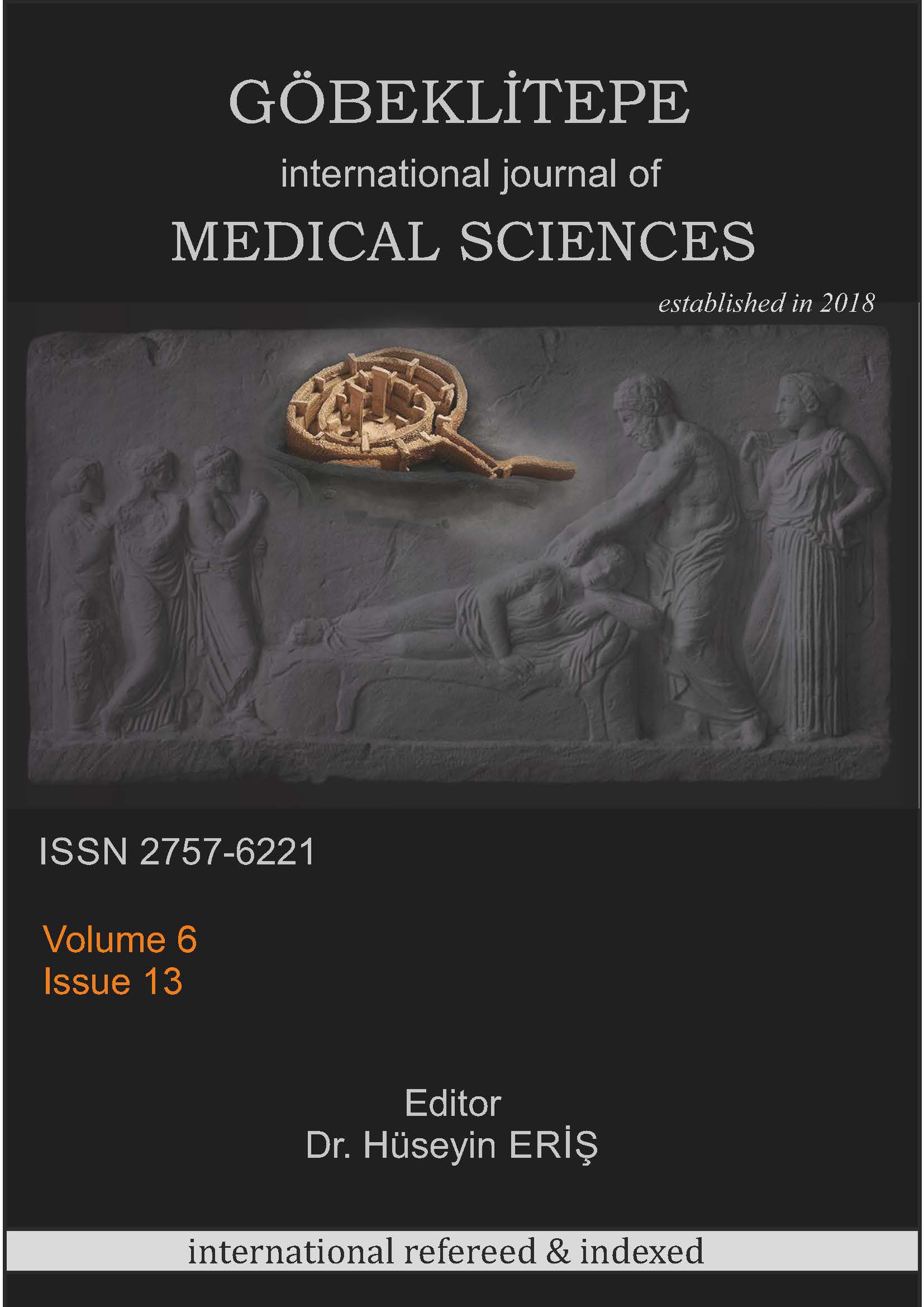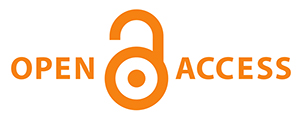İNTERNET BAĞIMLILIĞI İLE BESLENME VE EGZERSİZ DAVRANIŞLARI: ORTA ANADOLU ÖRNEĞİ, TÜRKİYE
DOI:
https://doi.org/10.55433/gsbd./206Anahtar Kelimeler:
İnternet Bağımlılığı, Beslenme, Egzersiz, Öğrenci, Hemşirelik, EbelikÖzet
Bu çalışma, üniversite öğrencilerinin internet bağımlılığı ile beslenme ve egzersiz davranışları arasındaki ilişkinin belirlenmesi amacıyla yapıldı. Tanımlayıcı tipteki bu çalışma, 20.11.2021-20.12.2021 tarihleri arasında Türkiye’de Orta Anadolu Bölgesinde bulunan bir Sağlık Bilimleri Fakültesi’nde yapıldı. Çalışmada evrenin %82’sine ulaşılarak, 597 üniversite öğrencinin katılımı ile tamamlandı. Araştırmanın verileri “Bilgi Formu”, “İnternet Bağımlılık Testi” ve “Beslenme Egzersiz Davranış Ölçeği” kullanıldı. Verilerin değerlendirilmesinde Sperman korelasyon analizi kullanıldı. Katılan öğrencilerin yaş ortalamasının 20.08±1.06 yıl, BKI ortalamasının 21.82±3.10 kg/m2, %84.8’inin kız olduğu saptandı. Öğrencilerin toplam Beslenme Egzersiz Davranış Ölçeği puan ortalaması 131.13±18.76 ve İnternet Bağımlılık Testi puan ortalaması 30.04±10.57’dir. Beslenme egzersiz davranış ölçeği ile internet bağımlılığı testi puan ortalamaları arasında pozitif yönde zayıf düzeyde bir ilişki vardır (p<0.001). Öğrencilerin internet bağımlılığı arttıkça psikolojik yeme davranışı ve sağlıksız beslenme egzersiz davranışı artmaktadır. Üniversite öğrencilerini sağlıklı beslenme konusunda destekleyecek mobil uygulama ya da online derslerin seçmeli ders olarak verilmesi önerilir.
Referanslar
Aldossari, N., & Al-Mahish, M. (2021). Social media and unhealthy food nexus: evidence from Saudi Arabia. Acta Alimentaria, 50(1), 102–111. https://doi.org/10.1556/066.2020.00178
Alosaimi, F. D., Alyahya, H., Alshahwan, H., Al Mahyijari, N., & Shaik, S. A. (2016). Smartphone addiction among university students in Riyadh, Saudi Arabia. Saudi Medical Journal, 37(6), 675–683. https://doi.org/10.15537/SMJ.2016.6.14430
Alpaslan, A. H., Koçak, U., Avci, K., & Uzel Taş, H. (2015). The association between internet addiction and disordered eating attitudes among Turkish high school students. Eating and Weight Disorders, 20(4), 441–448. https://doi.org/10.1007/s40519-015-0197-9
Arslan, S. A., Daşkapan, A., & Çakır, B. (2016). Specification of nutritional and physical activity habits of university students. TAF Preventive Medicine Bulletin, 15(3), 171–180. https://doi.org/10.5455/pmb.1-1436432564
Balta, Ç. Ö., & Horzum, B. (2008). Internet addiction test. Educational Sciences and Practice, 7(13), 87–102. https://www.researchgate.net/publication/272357837
Bozkurt, H., Özer, S., Şahin, S., & Sönmezgöz, E. (2018). Internet use patterns and Internet addiction in children and adolescents with obesity. Pediatric Obesity, 13(5), 301–306. https://doi.org/10.1111/IJPO.12216
Çam, H. H., & Nur, N. (2015). A Study on the prevalence of internet addiction and its association with psychopathological symptoms and obesity in adolescents. TAF Preventive Medicine Bulletin, 14(3), 181–188. https://doi.org/10.5455/pmb.20141016033204
Çelik, Ç. B., Odacı, H., & Bayraktar, N. (2015). Is problematic internet use an indicator of eating disorders among Turkish university students? Eating and Weight Disorders, 20(2), 167–172. https://doi.org/10.1007/S40519-014-0150-3
Centers for Disease Control and Prevention. (2019). Youth Risk Behavior Surveillance System (YRBSS). https://www.cdc.gov/healthyyouth/data/yrbs/index.htm
Flannery, O., Harris, K., & Kenny, U. A. (2021). An exploration into the impact of social networking site (SNS) use on body image and eating behavior of physically active men. Journal of Men’s Studies, 29(1), 26–49. https://doi.org/10.1177/1060826520913264/FORMAT/EPUB
Garibağaoğlu, M., Budak, N., Öner, N., Sağlam, Ö., & Nişli, K. (2006). The evaluation of nutritional status and body weights of female university students attending three different universities. Journal of Health Sciences, 15(3), 173–180.
Hendekci, A., & Avcı, İ. A. (2020). The relationship between internet addiction and nutrition exercise behaviours in adolescents. Ankara Medical Journal, 2, 315–326. https://doi.org/10.5505/amj.2020.52533
Holmberg, C., E. Chaplin, J., Hillman, T., & Berg, C. (2016). Adolescents’ presentation of food in social media: An explorative study. Appetite, 99, 121–129. https://doi.org/10.1016/J.APPET.2016.01.009
Karki, K., Singh, D. R., Maharjan, D., Sushmita, K. C., Shrestha, S., & Thapa, D. K. (2021). Internet addiction and sleep quality among adolescents in a peri-urban setting in Nepal: A cross-sectional school-based survey. PLOS ONE, 16(2), e0246940. https://doi.org/10.1371/JOURNAL.PONE.0246940
Kırca, K., & Kutlutürkan, S. (2019). Effect of smart phone addiction levels of nursing students on their communication skills. Kocaeli Üniversitesi Sağlık Bilimleri Dergisi, 5(2), 81–85. https://doi.org/10.30934/kusbed.523924
Konca, E., Ermiş, E., Ermiş, A., & Erilli, N. A. (2019). Analysis of physical activity states and nutritional habits of students between the age of 7 and 14. Journal of Turkish Studies-Social Sciences, 14(1), 105–117. https://doi.org/10.7827/turkishstudies.14821
Minaz, A., & Çetinkaya Bozkurt, Ö. (2017). Investigation of university students smartphone addiction levels and usage purpose in terms of different variables. Mehmet Akif Ersoy Üniversitesi Sosyal Bilimler Enstitüsü Dergisi, 9(21), 268–286. https://doi.org/10.20875/makusobed.306903
Pilař, L., Stanislavská, L. K., Kvasnička, R., Hartman, R., & Tichá, I. (2021). Healthy food on instagram social network: vegan, homemade and clean eating. Nutrients, 13(6), 1991. https://doi.org/10.3390/NU13061991
Rodgers, R. F., Melioli, T., Laconi, S., Bui, E., & Chabrol, H. (2013). Internet addiction symptoms, disordered eating, and body image avoidance. Cyberpsychology, Behavior and Social Networking, 16(1), 56–60. https://doi.org/10.1089/CYBER.2012.1570
Sampasa-Kanyinga, H., Chaput, J. P., & Hamilton, H. A. (2015). Associations between the use of social networking sites and unhealthy eating behaviours and excess body weight in adolescents. The British Journal of Nutrition, 114(11), 1941–1947. https://doi.org/10.1017/S0007114515003566
Serenko, A., Turel, O., & Bohonis, H. (2021). The impact of social networking sites use on health-related outcomes among UK adolescents. Computers in Human Behavior Reports, 3, 100058. https://doi.org/10.1016/J.CHBR.2021.100058
Sidani, J. E., Shensa, A., Hoffman, B., Hanmer, J., & Primack, B. A. (2016). The association between social media use and eating concerns among US young adults. Journal of the Academy of Nutrition and Dietetics, 116(9), 1465–1472. https://doi.org/10.1016/j.jand.2016.03.021
Tao, Z. L., & Liu, Y. (2009). Is there a relationship between Internet dependence and eating disorders? A comparison study of Internet dependents and non-Internet dependents. Eating and Weight Disorders - Studies on Anorexia, Bulimia and Obesity, 14(2–3), e77–e83. https://doi.org/10.1007/BF03327803
Tayhan Kartal, F., & Yabancı Ayhan, N. (2021). Relationship between eating disorders and internet and smartphone addiction in college students. Eating and Weight Disorders, 26(6), 1853–1862. https://doi.org/10.1007/S40519-020-01027-X
Turkish Statistical Institute. (n.d.). Household Information Technologies (IT) Usage Survey, 2021. https://data.tuik.gov.tr/Bulten/Index?p=Hanehalki-Bilisim-Teknolojileri-(BT)-Kullanim-Arastirmasi-2021-37437#:~:text=İnternet kullanım oranı 2021 yılında,w%2C5 olduğu görüldü.&text=92%2C0 oldu-,Genişbant ile İnternete erişim sağlayan hanelerin,yılında %92
Turkish Statistical Institute. (2021). Turkish Statistical Institute. https://data.tuik.gov.tr/Bulten/Index?p=Istatistiklerle-Genclik-2020-37242#
World Health Organization. (n.d.). Adolescent and young adult health [Fact sheet]. Retrieved September 25, 2022, from https://www.who.int/news-room/fact-sheets/detail/adolescents-health-risks-and-solutions
Ying, C. Y., Maria Awaluddin, S., Kuay, L. K., Man, C. S., Baharudin, A., Yn, L. M., Sahril, N., Omar, M. A., Ahmad, N. A., & Ibrahim, N. (2021). Association of internet addiction with adolescents’ lifestyle: a national school-based survey. International Journal of Environmental Research and Public Health, 18(1), 168. https://doi.org/10.3390/IJERPH18010168
Yurt, S., & Özdemir, T. (2020). What is the Nutrition and Exercises Behaviour of University Students? Journal of Education and Research in Nursing, 17(3), 238–281. https://doi.org/10.5222/HEAD.2020.58234
Yurt, S., Save, D., & Yıldız, A. (2016). Developing an evalution scale of nutrition exercise behaviours for adolescents; it’s validity and reliability. Türkiye Klinikleri J Public Health Nurs-Special Topics, 2(1), 19–25.
İndir
Yayınlanmış
Sürüm
- 2024-07-02 (2)
- 2023-10-03 (1)
Nasıl Atıf Yapılır
Sayı
Bölüm
Lisans
Telif Hakkı (c) 2023 Göbeklitepe Sağlık Bilimleri Dergisi

Bu çalışma Creative Commons Attribution 4.0 International License ile lisanslanmıştır.




